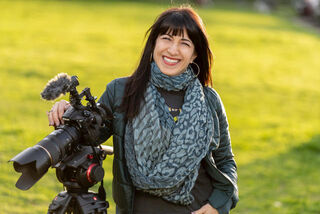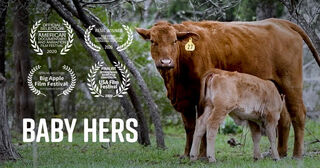Consumer Behavior
"Baby Hers": All Babies Belong With Their Mothers
An interview with filmmaker Susan Rosenzweig on the hidden horrors of dairy.
Posted August 2, 2020 Reviewed by Ekua Hagan
A mother's bond should never be broken.
"Sadly 99% of all of the food in the US currently comes from these types of industrial farms. It’s the product of unchecked greed and production—and is beyond cruel. It helps that major news media outlets are finally talking about what really goes on at factory farms and live markets ... I do hope the film [Baby Hers] gives people the permission to ask themselves about their role in a food system that has gone way off the rails." —Susan Rosenzweig
A few weeks ago, I watched a riveting new film called Baby Hers by writer and award-winning filmmaker Susan Rosenzweig.1 It reminded me of an interview I did with Olympic cyclist Dotsie Bausch about her views on the dairy industry. The trailer for Baby Hers can be seen here, and the website for the film can be seen here.
Parts of Baby Hers left me speechless. I've long been appalled at the brutal mistreatment of so-called "dairy animals" who are sentient and feeling beings, and I always ask people to think about who they're eating or who they're drinking, rather than what they're eating or what they're drinking. I've also often wondered what a fully sentient mother dairy cow would tell us about her children, so I was thrilled Susan could take the time to answer a few questions about a deeply moving story focusing on the ways in which these sentient "milk machines" are unrelentingly abused.

Why did you make Baby Hers?
For as long as I can remember, I’ve loved animals and wanted to help them. From bugs and birds to horses and elephants. I became a vegetarian when I was nine and made the connection between the lamb chops on my plate and those sweet sheep at the petting zoo. That was it; I never looked back.
I thought vegans were extreme—a little crazy even, to be honest. But then six years ago, I discovered that it actually hurt chickens and cows to use their eggs and milk and I was outraged. I wrote about it in a piece for Huffington Post, but sadly I knew few people would read it.
Then, while I was guest lecturing at an advertising class at St. Edward’s University a couple years ago, I met Professor Roger Gans, who was doing research on the power of narrative persuasion and film. As he says, “It can get people to consider alternative points of view that no amount of logical argument or directive persuasion ever could.” That’s when I realized I needed to tell the story visually, to get people to empathize with animals and see how they are just like us.

How does your film relate to your background and general areas of interest?
I’ve been an advertising copywriter/creative director for over 20 years, and for most of those years, all I’ve wanted to do was PSAs or pro-bono work. When I was a junior copywriter at Ogilvy & Mather in New York City, my partner and I cold-called the Executive Director of the National Eating Disorders Association (NEDA) and led the creative on a celebrity pro-bono campaign. After that, anything less than work that helped change lives has paled in comparison to me. My marketing background also helped me tremendously in terms of understanding the need to focus on a target market, their mindset, and how they would best receive the message.
Who is your intended audience?
My primary audience is mothers, for several reasons: Clearly they can best relate to the fierce feelings of love and protection for their children. And women tend to be more empathetic in general. But also because women make 93% of all food purchases, and 84% of women make all of the meals in their household.
My mom was who I pictured as my target market: She loves animals but never wants to hear about the bad things that happen to them—it upsets her too much. Most people don’t want to know, but not knowing something doesn’t stop it from happening. So I knew I needed to figure out how to get someone like her to watch.
What are some of the topics you weave into your film and what are some of your major messages?
Baby Hers exposes the tragic and true story of how we get milk: by stealing it from lactating mothers and kidnapping their babies—usually the day they are born. It’s really one of the best-kept secrets of the dairy industry, even I spent the majority of my life thinking that cows “just make milk.” Big farming and all those “happy cow” ad campaigns have done an amazing job hiding the fact that cows only produce milk for the same reason human mothers do: to feed their babies.
How does your film differ from others that are concerned with some of the same general topics?
I hope hearing the truth from someone like Jim Richardson makes it harder to ignore the problem. Jim is a small dairy farmer who is also a veterinarian and truly cares about animals. I met him maybe six months earlier at a local farmer’s market, where we spoke about my desire to make a film on what really goes on in factory farming. I don’t know that the film would be as powerful without his perspective. I’m eternally grateful for his honesty and transparency about what he’s seen.
Are you hopeful things will change for the better as people learn about what really goes on to make meals and other animal products?
I’m always hopeful—now more than ever, actually. I’ve seen more and more people switch to plant-based diets lately. To me, it’s a silver lining of this global pandemic that people seem to be connecting the dots between how animals are treated to what they eat.
Sadly, 99% of all of the food in the U.S. currently comes from these types of industrial farms. It’s the product of unchecked greed and production—and is beyond cruel. It helps that major news media outlets are finally talking about what really goes on at factory farms and live markets. Since the Hunan Seafood Wholesale Market is believed to be the source of COVID-19, there have been stories all over the news finally exposing this truth. When Rachel Maddow starts talking about the connection, people listen.
What are some of your current projects?
I’m currently focused on getting Baby Hers into film festivals and looking for partners to help me create a PSA so even more people can see the message. After that, I’m hoping to start work on a new animal advocacy project. Anything that allows me to be a voice for the voiceless.
Is there anything else you'd like to tell readers?
I don’t expect everyone to go vegan, at least not now, but I do hope the film gives people the permission to ask themselves about their role in a food system that has gone way off the rails. We all suffer as a result of factory farming, but the animals suffer the worst. We are all connected.
I’d also encourage them to look for ways to help change the system: by signing petitions, shopping local, and exploring new plant-based foods that could very soon become their new favs. My new Instagram account @howtoditchdairy features amazing non-dairy alternatives you can try. Like Angela says in the film, start with one thing and see what you like. I was really pissed about going vegan at first, but now I couldn’t imagine going back.
References
Note:
1) Susan is a writer/filmmaker who is passionate about anything that has the power to help others—especially those with no voice of their own. She has over 20 years of experience in all kinds of advertising and marketing: TV, print, digital, social media, blog writing, and content creation. Clients have included U.S. Air Force, Dove, Hershey, Wal-Mart, Clearasil and Volvo at top advertising agencies like Ogilvy & Mather, R/GA, Havas and GSD&M. After 17 years in New York City, Susan made the move south to Austin to enjoy the better culture, vegan breakfast tacos, and sunshine—and to use her powers of persuasion as creative director on causes like drunk driving prevention and water conservation. “Baby Hers” is her first independent film. LinkedIn; Baby Hers Trailer; Baby Hers Website; Upcoming festivals: Big Apple Film Festival, August 18-20, 2020; American Documentary and Animation Film Festival, September 25-29, 2020
Bekoff, Marc. What Would a Mother "Food" Cow Tell Us About Her Children?
_____. The Scary Facts of Dairy Violate the Five Freedoms.
_____. Why Are Cows Meat, Pigs Pork, Turkeys Turkey, and Tunas Tuna?
_____. The Mistreatment of Female "Food Cows" Includes Sexual Abuse. (Have you ever stopped to consider how female cows are objectified and exploited?)
_____. Cows: Science Shows They're Bright and Emotional Individuals.
_____. From Addiction, Healing, and the Olympics to Animal Activism. (An interview with the multitalented Dotsie Bausch, founder of Switch4Good.)
_____. Can Animals Have Wives, Husbands, Children, and Orgasms?




